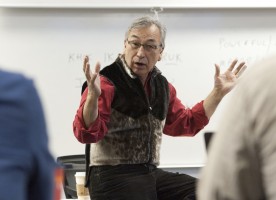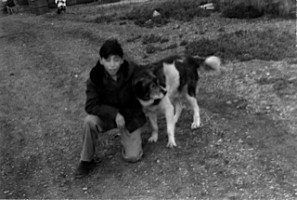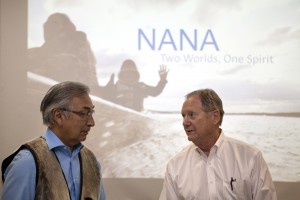I AM UAA: Willie Hensley
by Ted Kincaid |
Visiting Distinguished Professor, Alaska Policy Frontiers Hometown: Kotzebue, Alaska Fun Fact: Brought in homemade caribou stew to his last class this fall semester
At 70-something, Willie Iggiagruk Hensley has managed to survive-and even understand-a dramatic upheaval that shook Alaska in his lifetime.
Wits and circumstance carried him from a sod house near Kotzebue to a firm foothold in the cash economy. He went from BIA classrooms to a boarding school in Tennessee to a political science degree earned at George Washington University. He has been a state legislator, commerce commissioner, Native corporate CEO and a K Street lobbyist in Washington D.C.
Now, add professor. He's teaching a graduate class at UAA's College of Business and Public Policy that focuses on Alaska's future by studying its plundered past. The class is part of an initiative to include knowledge and understanding of Native corporations-the fastest growing economic sector in Alaska-into the business school curriculum.
His doctorate may be honorary, but his political experience and passion for history have coalesced into a highly customized class called Alaska Policy Frontiers. The big looming puzzles include what to do with Pebble and other rich deposits; the high cost of energy and distance from markets; the decline of oil-fueled state revenue; and how to educate Alaskans for a survivable future.
Hensley takes his compass bearings from the past. He's spent a lifetime collecting history and anthropology books and first-person accounts of arctic explorers, warmongers, missionaries and government bureaucrats. A one-page flyer for the class advises, "you have to understand where you have been before you can see where you are going."
"Most of us don't know anything about Alaska," says Hensley. "On the Native side, the system was busy trying to assimilate us and didn't want us to know anything about our language and culture. That's the process of colonization.
"On the non-Native side, history began when grandpa arrived [in Alaska]."
But when Hensley jumps in the way-back machine, he's not talking pre-statehood, or even the Russian occupation. He goes back to what he considers the igniting event of Alaska's history: a 1582 battle in the Ural Mountains between forces supported by the Russian Tzar against the grandson of Genghis Khan, facilitated by a merchant named Stroganov and blessed by the Russian Orthodox Church. The city of Sibir fell in the battle, and within 60 years the Russians were on Alaska's doorstep.
The big driver was sea otter fur, replaced over time by whales, gold, fish and crude. But, from Hensley's perspective, the key to understanding Alaska today is realizing how commerce, government and religion conspire to colonize and conquer people and place.
Left in that wake: Alaska's indigenous populations-proud, resilient and resourceful survivors, now damaged by disease, alcohol and conquerors invested in dismissing their values and culture. In spite of this repressive past, Alaska Natives today use their capital and land to move Alaska's economy forward.
Teaching this class has allowed Hensley to come full circle. Back in 1966, fresh out of George Washington University, he was homesick for Alaska and unsure what to do next. At UAF, he happened upon a constitutional law class taught by Alaska's new chief justice, Jay Rabinowitz. It was just seven years after statehood.
He owed a paper, and with encouragement from Rabinowitz, researched Alaska Native land rights.
"Before that, I was completely ignorant of the Alaska Native legal and historical perspective. It was a giant eye-opener: we were in jeopardy of losing 44 million acres. I became an activist."
In it's third semester at UAA, Hensley's class is an upper division course of diverse students, "some at the end of their careers and some at the beginning of their careers," says University of Alaska Regent Kirk Wickersham, who is among the roll call this semester. When asked why he chose to take Hensley's class, he simply says, "Why would you not? Willie is a walking breathing repository of the history of this state for the last 50 years."
Ironically, Wickersham was also in Rabinowitz's constitutional law class with Hensley back in 1966. Just as it set Hensley on a lifelong trajectory, it changed Wickersham's life as well: "Jay Rabinowitz had everything to do with me going to law school," says Wickersham, an actively retired attorney and real estate broker in Anchorage. "And what Hensley's class does is gives you a great foundation with which to look at some of these existing present day public policy issues. I feel that anybody interested in the history, politics and culture of Alaska should be in this class. I'm taking it for it's own sake for the enrichment of it."
Like Rabinowitz, Hensley requires a research paper from each of his students. Latent in that assignment is the hope that each will find a topic that inspires them like land claims ignited him.
"I hope some idea will take root," he says, "and change their lives forever."
And since it's a public policy class, their work might also change ours.
More on the web:
• Read Hensley's 1966 paper: "What Rights to Land Have the Alaska Natives? The Primary Question."
• Read a similar article in "Hometown U" on ADN.com and get a glimpse of a recent boarding school panel from Hensley's Fall 2012 public policy class, and then watch the panel online.
 "I AM UAA: Willie Hensley" is licensed under a Creative Commons Attribution-NonCommercial 4.0 International License.
"I AM UAA: Willie Hensley" is licensed under a Creative Commons Attribution-NonCommercial 4.0 International License.












